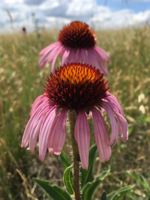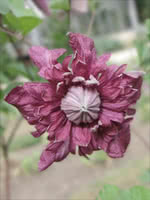Mon-Fri 9am - 5pm Mountain time
Narrow-Leaved Coneflower (Echinacea) vs Purpurea Plena Elegans Clematis
Echinacea angustifolia
Clematis Purpurea Plena Elegans
NOT AVAILABLE THIS SEASON - MIGHT RETURN
NOT AVAILABLE THIS SEASON - MIGHT RETURN
Narrow-Leaved Coneflower is a native perennial wildflower known for its pink to pale purple, daisy-like blooms. The petals (rays) droop downwards, around a dark, domed center, giving the flower a cone-like appearance. The nectar-rich blossoms attract a wide variety of pollinators, including native bees and butterflies. After flowering, the seeds provide food for birds, further adding to its ecological value.
Once established, it is drought-tolerant due to its deep taproot, which also helps stabilize soil. Narrow-Leaved Coneflower thrives in a variety of well-drained soils, including sandy, rocky, and alkaline. It often grows alongside the native grasses that characterize prairie and grassland ecosystems, making it well-suited for prairie and grassland restoration, naturalization, and pollinator gardens.
Purpurea Plena Elegans Clematis (P.P.E) is a stunning climbing vine. The flowers are double flowers, meaning they have an inner pompom surrounded by outer petals. They are distinct dusty rose colour with a long bloom time from mid-summer to early fall. They can remain on the vine for up to three weeks. It is durable and easy to maintain and train.
One of the oldest clematis cultivars, Purpurea Plena Elegans Clematis (P.P.E) is a winner of the Royal Horticultural Society's Award of Garden Merit.
The Purpurea Plena Elegans Clematis will attract pollinators to your yard or garden attracting butterflies and hummingbirds. Because it is a climbing species, support from a trellis or fence is recommended. New vines emerge from the ground, so pruning should be done in early spring.

